Alabama leads nation in eliminating Chinese Communist Party influence in higher education

Lawmakers hailing from both sides of the aisle in Washington are shifting their focus to an increasingly relevant threat towards national security and academic freedom: Confucius Institutes. Funded by the Chinese Communist Party (CCP), these institutes have expanded to over 67 individual university campuses nationwide, with an additional 500 Confucius Classrooms at K-12 schools. Ambiguously labeled as cultural centers, Confucius Institutes have simultaneously proven themselves to be a vehicle of China’s political agenda through propaganda and intelligence gathering. Within these classrooms, historical events are only permitted to be discussed through a rosy lens towards the Chinese government, while documented events such as the 1989 Tiananmen Square protests, or the current human rights abuses against the Uyghurs, are prohibited from the entirety of classroom discourse. During a U.S. Senate Intelligence Committee hearing, Federal Bureau of Investigation (FBI) Director Christopher Wray confirmed that the FBI has observed China use “nontraditional collectors, especially in the academic setting” to engage in espionage and will continue to take “investigative steps” at Confucius Institutes. Additionally, the U.S. Department of State designated Confucius Institutes as “an entity advancing Beijing’s global propaganda and malign influence campaign on U.S. campuses and K-12 classrooms.” The state of Alabama has hosted two Confucius Institutes in its history; with established institutes at Alabama A&M University, Auburn University at Montgomery, and Troy University. Alabama A&M University’s Confucius Institute successfully closed in April 2021 after receiving notification of a potential loss of eligibility for federal funds. Other key actors in the state who advocated for the closure of Confucius Institutes include groups such as the College Republican Federation of Alabama as well as legislators Congressman Mo Brooks and State Representative Tommy Hanes (R-Bryant). Congressman Mo Brooks, a member of Alabama’s congressional delegation, was one of the initial Washington lawmakers to bring attention to the influence of Confucius Institutes. Brooks has served as an original cosponsor for the Higher Education Transparency Act, the Transparency for Confucius Institutes Act, the Foreign Influence Transparency Act, in addition to bipartisan effort, the Concerns Over Nations Funding University Campus Institutes in the United States (CONFUCIUS) Act. While the state of Alabama has made national headway in approaching the closure of Confucius Institutes within its state, not all of Alabama’s leading figures are zealous to join the national movement to limit foreign influence in the U.S. education system. Alabama House Bill 9 and Senate Bill 280, respectively, intended to cease funding of Confucius Institutes and were both opposed by Chair of the House Education Policy Committee, Terri Collins (R-Decatur), and Senator Jim McClendon. It was later revealed that Senator McClendon embarked on a 2015 Confucius Institute-sponsored trip to China. A number of former Alabama legislators, including a Troy University board of trustees member, also participated in the same Confucius Institute-sponsored international trip. Troy University continues to defend its relationship with its Confucius Institutes in a written statement, “Troy University’s association with the Confucius Institute has been positive, and we have seen no evidence of undue political influence from the Chinese government nor has there been any evidence of intellectual theft.” Time will tell if the state of Alabama will continue to lead the nation in defending national security and preserving academic freedom through the closure of the state’s last remaining Confucius Institute at Troy University.
Secretary of State John Merrill exits Senate race
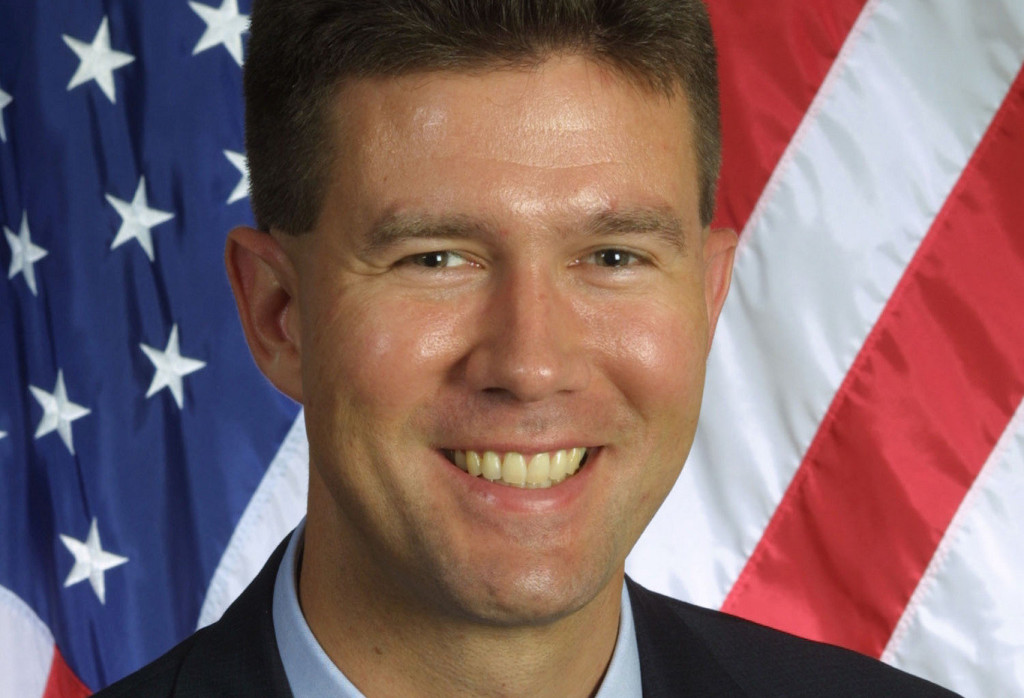
Alabama Secretary of State John Merrill suspended his campaign for the U.S. Senate on Sunday, citing former Attorney General Jeff Sessions’ entrance into the crowded Republican race. Merrill announced his decision in a statement posted on his Facebook page. Merrill said he “saw a path to victory” when he entered the race in June, but that Sessions’ decision to join the field last month “dramatically” changed the race to challenge Democratic Sen. Doug Jones in 2020. “With Senator Sessions’ late entry into this race, we have come to realize that a crowded Republican primary only benefits Doug Jones and the out of touch liberal Democrats,” Merrill said in the statement. Others contending for the GOP nomination include former Auburn University football coach Tommy Tuberville, U.S. Rep. Bradley Byrne, state Rep. Arnold Mooney and Roy Moore, the right-wing lightning rod who faced allegations of sexual misconduct and lost to Jones in the 2017 special election. Jones is the only Democrat to hold statewide office in Alabama. The large field has increased the chances that the March 3 GOP primary will head to a runoff if no candidate tops 50 percent of the primary vote. Merrill, who has previously said he considers Sessions one of his heroes, did not make an endorsement in the statement. He said he would continue to serve as Alabama’s secretary of state. Republished with the Permission of the Associated Press.
Roy Moore files lawsuit over ads from 2017 campaign
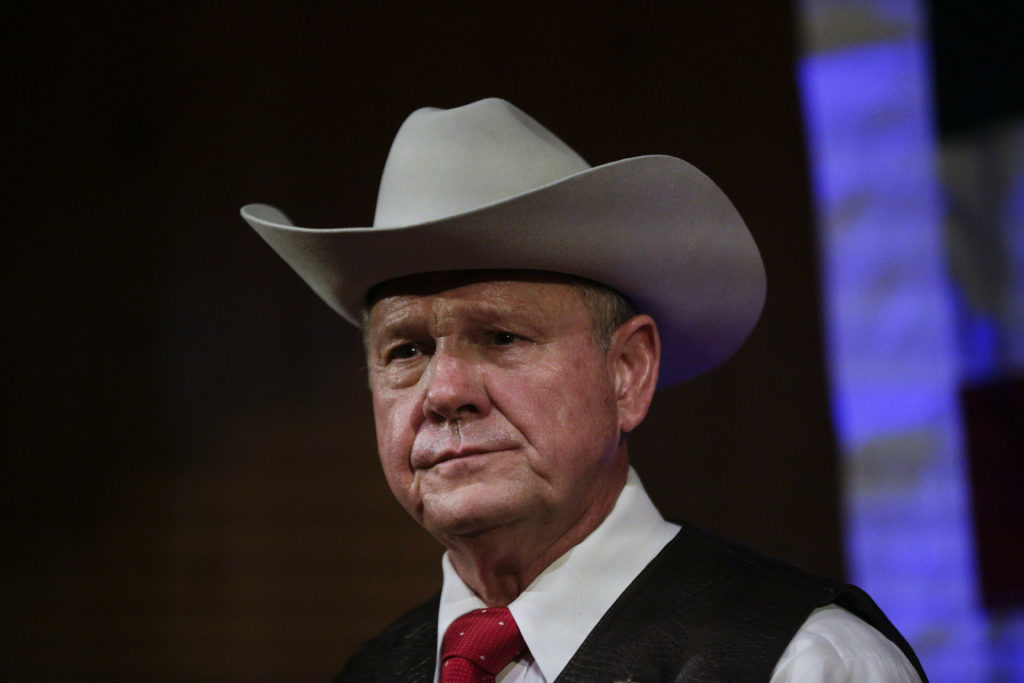
Republican Roy Moore has filed a lawsuit against people involved with a group that spent millions against him in the 2017 U.S. Senate race. Moore announced the defamation lawsuit Friday. In a press statement, he said it was part of “fraudulent campaign tactics” against him in the 2017 race he lost to Sen. Doug Jones. The political action committee called Highway 31 produced advertisements and mailers focused on accusations against Moore of sexual misconduct involving teenage girls decades ago. Moore denied the accusations. It was disclosed after the election that the PAC received money from Senate Majority PAC, which works to elect Democrats to the U.S. Senate and $910,000 from Priorities USA. The lawsuit names the groups and others as defendants. Moore has filed multiple lawsuits over the misconduct accusations. Republished with the permission of the Associated Press.
Jeff Sessions to announce Alabama Senate bid
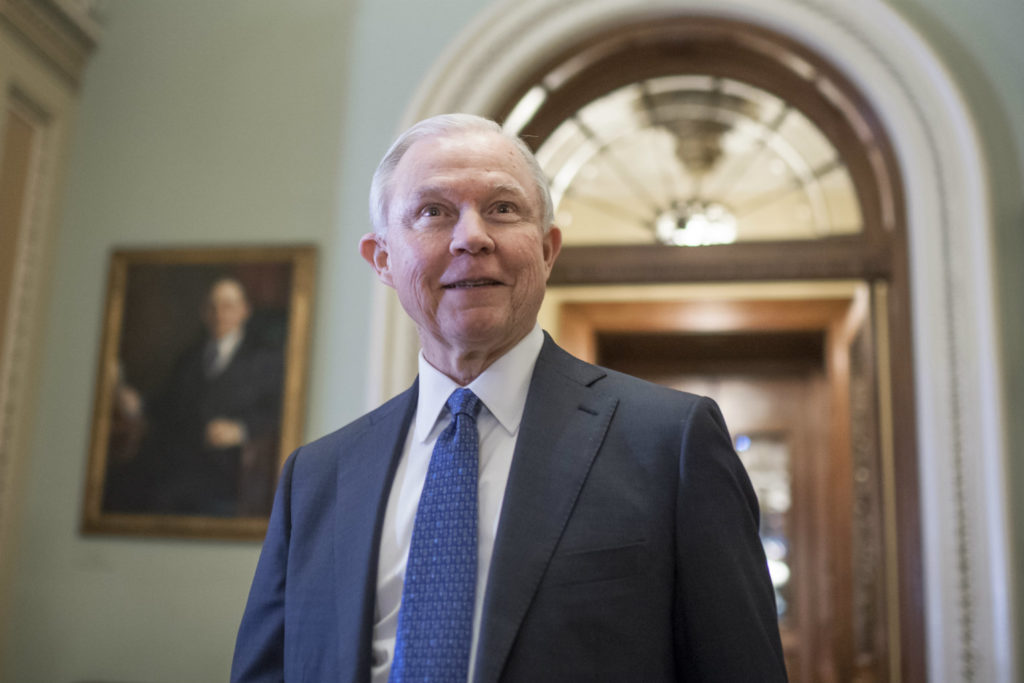
Former Attorney General Jeff Sessions will announce that he is entering the race for his old U.S. Senate seat in Alabama, two Republicans with direct knowledge of his plans said Wednesday. Sessions, 72, will be making a return to the political stage a year after stepping down as President Donald Trump’s first attorney general when their relationship soured over his recusal from the Russia investigation. The two Republicans confirmed to The Associated Press that Sessions is expected to announce his candidacy Thursday. They were not authorized to discuss the matter publicly and spoke on condition of anonymity. They said Sessions has not spoken to Senate Majority Leader Mitch McConnell about it, nor has he informed Trump of his decision. The longtime senator’s candidacy upends the 2020 Republican primary, which has a crowded field competing to challenge Democratic Sen. Doug Jones for the once reliably red seat. Some GOP primary rivals wasted no time going on the offensive. Former Auburn University football coach Tommy Tuberville said Sessions has been “out of the swamp for less than two years, and now he’s itching to go back.” “He’s another career politician that the voters of Alabama will reject. As Attorney General, he failed the President at his point of greatest need,” Tuberville said in a statement. U.S. Rep. Bradley Byrne, the first Republican to announce a run for the Senate seat, played up his loyalty to Trump when asked about Sessions’ plans to enter the race. “Alabama deserves a Senator who will stand with the President and won’t run away and hide from the fight,” Byrne said in a Wednesday statement. Sessions was the first U.S. senator to endorse Trump’s 2016 campaign, and the two supported similar policies on immigration and law enforcement. But Sessions’ recusal from the Russia inquiry prompted blistering public criticism from Trump, who eventually asked him to resign. Despite enduring repeated public mocking, Sessions has remained a Trump loyalist who continues to back the president’s policies. In a speech last month at a Republican Party fundraiser in Huntsville, Sessions reiterated his support for the president even as he joked about life after being “fired” from a job. Sessions praised Trump’s effort on trade, immigration and foreign policy. “That’s why I supported him and why I still do support him,” Sessions told the crowd of about 500. “He is relentlessly and actually honoring the promises he made to the American people.” Sessions, for years a popular figure among state Republicans, represented Alabama in the U.S. Senate from 1997 to 2017. He will enter the race as a presumed front-runner, but the effect of Trump’s online and verbal lashings has yet to be seen in Alabama, where the president remains popular. In June, Trump called his selection of Sessions as attorney general his “biggest mistake.” “I would say if I had one do-over, it would be, I would not have appointed Jeff Sessions to be attorney general,” Trump said in an interview on NBC’s “Meet the Press.” One of the Republicans who spoke anonymously to the AP sees no indication that Trump has changed his feelings about Sessions and thinks he’ll eventually fall back because of the president’s attacks. But David Hughes, a political scientist at Auburn University at Montgomery, said there is no reason to think Sessions wouldn’t immediately be a front-runner. “He has a baked-in constituency. He has a huge donor network. … He’s got name recognition and the people of Alabama still largely like him,” Hughes said. In Alabama, midterm voters gave mixed assessments of their former senator. About as many said they had a favorable opinion of Sessions as unfavorable, 45 percent to 42 percent, according to AP VoteCast, a midterm survey of more than 750 voters in Alabama. Democratic voters were overwhelming negative, with 75 percent saying they view Sessions unfavorably. Even among Republican voters, about a quarter said they had a negative impressions; about two-thirds rated Sessions favorably. The Republican primary also includes Alabama Secretary of State John Merrill; former Alabama Chief Justice Roy Moore, who lost to Jones in a special election two years ago; state Rep. Arnold Mooney; and businessman Stanley Adair. By Brian Slodsko and Kim Chandler. Chandler reported from Montgomery, Ala. Associated Press writer Hannah Fingerhut contributed to this report from Washington. Republished with the permission of the Associated Press.
AP sources: Jeff Sessions exploring possible Alabama Senate run
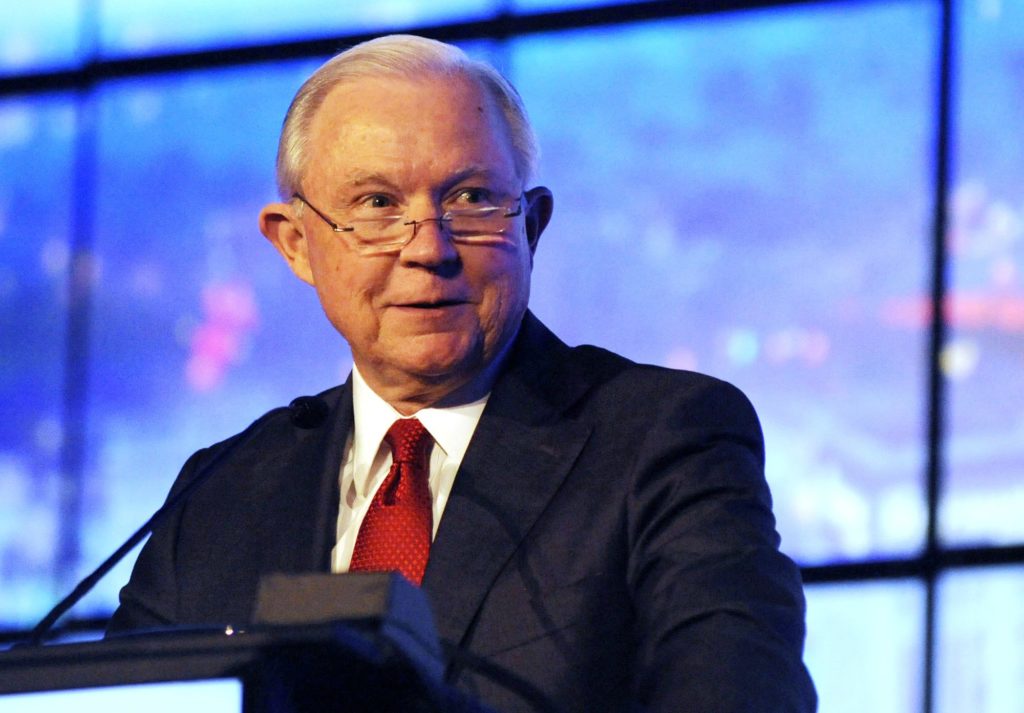
Former U.S. Attorney General Jeff Sessions is exploring the possibility of a run for his old Senate seat in Alabama, according to three Republicans with knowledge of the situation. They say Sessions has made telephone calls discussing a potential bid to return to the Senate. The Republicans spoke on condition of anonymity so they could speak more freely about closely held conversations. It was not immediately clear how close Sessions was to making a decision or the seriousness of the exploration. He has until 5 p.m. Nov. 8 to decide whether to be a last-minute entry into the 2020 race. The Alabama Republican Party sets the deadline. Sen. Doug Jones, a Democrat, won the 2017 special election to fill Sessions’ seat by defeating Republican Roy Moore. Republicans see recapturing the seat in the once reliably red state as a top priority in 2020. Sessions’ entry into the race would upend an already competitive primary that includes U.S. Rep. Bradley Byrne, former Auburn University football coach Tommy Tuberville, Alabama Secretary of State John Merrill, Moore and others. Sessions was a beloved figure among state Republicans after serving in the Senate for 20 years. But a new campaign would face the impact of a soured relationship with President Donald Trump. Sessions left the Senate to become Trump’s first attorney general. He was ousted after enduring repeated public mocking from Trump for recusing himself from special counsel Robert Mueller’s Russia investigation. An unknown factor is how Trump’s bashing would affect a Sessions campaign, particularly if the president’s criticism continued through a Senate race. Trump in June called his selection of Sessions as attorney general his “biggest mistake.” “I would say if I had one do-over, it would be, I would not have appointed Jeff Sessions to be attorney general,” Trump said in an interview on NBC’s “Meet the Press.” Trump won 62 percent of the vote in Alabama in 2016. “I suspect Sessions would become an immediate front-runner if he were to enter the race,” said David Hughes, a political scientist at Auburn University in Montgomery. Hughes noted that Alabama voters picked Moore over a Trump-backed primary candidate in 2017 and that “Sessions has done little to distance himself from Trump.” In a telephone interview Monday night, Merrill said, “Obviously, if he became a candidate, that would change the dynamic of the race dramatically.” Merrill said he and others would have to decide what course of action their campaigns would take if Sessions entered the race. Sessions received a standing ovation when he spoke at a party fundraiser earlier this month in which he reiterated his support for Trump. “He is relentlessly and actually honoring the promises he made to the American people,” Sessions said in the speech at Huntsville. Sessions did not mention the Senate race but criticized Democrats as the party that sees “more government” as the answer. He said he believes Republicans could achieve historic congressional majorities in 2020, but he cautioned that they must show they are responding to the concerns of average Americans. Alan Fram reported from Washington. Republished with the permission of the Associated Press.
Donald Trump rakes in cash while some Senate Republicans lag
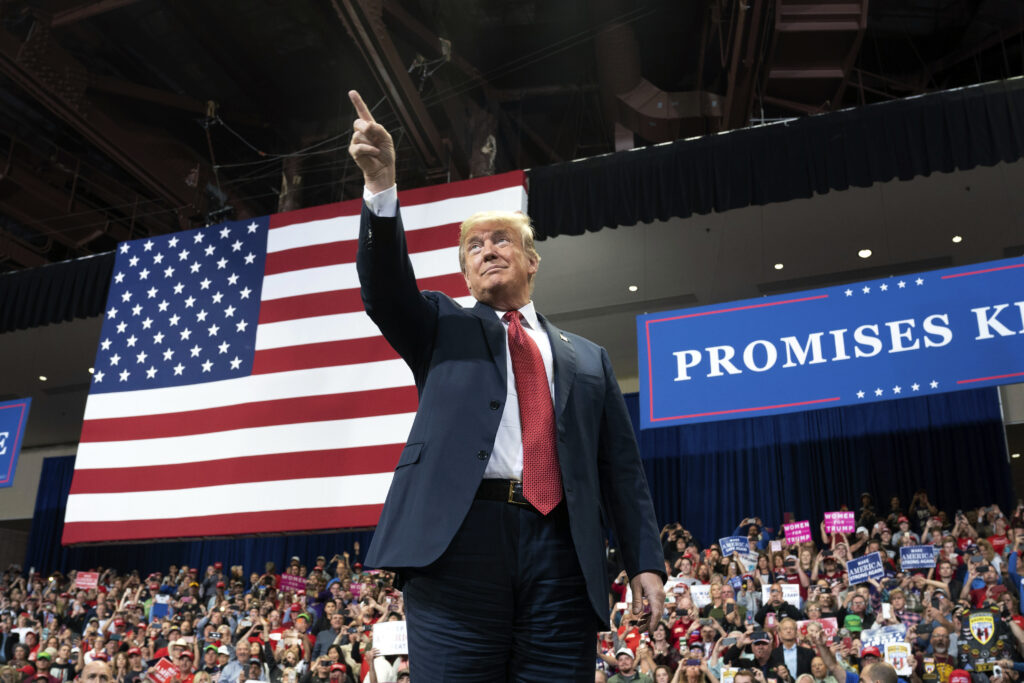
President Donald Trump is raising record amounts of cash for his 2020 reelection. But that fundraising might isn’t spilling over to the most vulnerable Republicans fighting to hold onto their seats in a narrowly divided Senate. During the third quarter, former astronaut Mark Kelly took in $2.5 million more than Republican Sen. Martha McSally in Arizona. In Maine, state House Speaker Sara Gideon bested longtime Republican Sen. Susan Collins by over $1 million. And in Colorado, Cory Gardner, who led Senate Republicans’ campaign arm in 2018, barely outraised former Gov. John Hickenlooper, who had been in the race just five weeks before the quarter ended. The trouble for Republicans extends to states where they’re supposed to be on firmer ground. Iowa Sen. Joni Ernst didn’t crack $1 million and was outraised by the leading Democrat. North Carolina Sen. Thom Tillis narrowly outraised Democrat Cal Cunningham but is also facing a primary challenge from the right that has forced him to spend millions in early TV and radio ads. The lagging numbers suggest that much of the enthusiasm among the GOP base is focused on Trump and doesn’t necessarily translate to Republicans running for other offices. Democrats, meanwhile, are paying close attention to races across the board, including the House, Senate and presidency, fueling them with small-dollar donations that Republicans have struggled to counter. Fundraising prowess isn’t always an indicator of who will actually win on Election Day. But the dynamic could complicate the GOP’s effort to maintain their 53-47 grip on the Senate. This should serve as a “real wakeup call,” said Scott Reed, a senior political strategist for the U.S. Chamber of Commerce, a group that has long been allied with Senate Republicans. The “ongoing Trump drama” over impeachment and other issues “drowns out all the political news back home every single night,” making it difficult for GOP candidates to get their message out, Reed said. But the challenges facing Republicans have mounted in recent weeks as the Democratic-controlled House pursues an impeachment inquiry. Instead of focusing on their own records, Republicans seeking reelection have often been barraged with uncomfortable questions about Trump’s conduct. The pressure will only grow if the Senate holds an impeachment trial, forcing these Republicans to decide whether Trump should be removed from office. “Republicans are going to struggle with fundraising and messaging if the only thing they can talk about is President Trump,” said Jonathan Kott, who was a senior adviser to Sen. Joe Manchin, a West Virginia Democrat, during his successful 2018 reelection bid. “What we found is no matter how popular the president is, you have to stand up to him when it’s good for your state. Democratic senators are finding a way to do that. Republican senators aren’t.” Democrats also have a small-dollar cash advantage. Despite an organized push, Republicans have yet to develop an online fundraising behemoth rivaling ActBlue, the Democrats’ donation platform, which enables donors across the country to direct a contribution of $1, $5 or any amount up to $2,800 with a few taps on a smartphone. “Democrats over the last several years have formulated a culture among the activist class where every time they are motivated by content or a candidate they contribute five bucks,” said Josh Holmes, an adviser to Senate Majority Leader Mitch McConnell, who is running for reelection in Kentucky and was outraised almost 5-to-1 last quarter even though the state isn’t considered a battleground. “Republicans have made strides, but we still have a long way to go.” Still, there are bright spots for the GOP. In order to regain control of the Senate, Democrats might have to win in states that have traditionally sided with Republicans over the past two decades, such as Arizona and Georgia. And some GOP candidates are successfully putting Democrats on defense. Michigan candidate John James, who came up short in his bid last year to oust Sen. Debbie Stabenow, is now beating Democratic incumbent Gary Peters in the money game. The African American, pro-Trump candidate raised $3 million, while Peters took in $2.4 million over the past three months, records show. In Georgia, where there will be two Senate seats on the ballot because of the retirement of Sen. Johnny Isakson, Democrats are still sorting out who all will run. Jon Ossoff was the top-raising Democrat in the contest to take on Republican incumbent David Perdue. But of the $1.3 million he took in, more than $500,000 was left over from his failed 2017 bid for a suburban Atlanta House seat. Perdue, meanwhile, raised about $2.5 million. While Republicans acknowledge they face an unfavorable political environment, it’s also early in the cycle. In 2018, Democrats appeared to be making strides in Senate contests as the election neared, but the party’s handling of a sexual misconduct allegation leveled against now-Supreme Court Justice Brett Kavanaugh galvanized the Republican base and helped them turn the tide. Kavanaugh denies the allegation. If Democrats were to mishandle the impeachment inquiry of Trump, it could deliver a similar jolt. “Democrats have found fundraising success pretty regularly during the last several years,” said Jesse Hunt, spokesman for the Republican Senatorial Campaign Committee. “In many cases, that’s not manifested itself into electoral victories.” By Brian Slodyski Associated Press Republished with the permission of the Associated Press.
Democratic Senator Doug Jones in a bind on impeachment

U.S. Sen. Doug Jones walked into a recent town hall and declared he was ready for whatever his constituents wanted to throw at him. But first, he wanted to address the biggest news from Washington: The House impeachment inquiry of President Donald Trump. “I’m not making a judgment about where we are on any of this because it’s too early,” Jones said, not waiting to be asked. He noted his potential role as a juror if the issue lands in the Senate. Already considered the Senate’s most endangered Democrat, the senator is facing the uncomfortable possibility of having to vote on removing the president from office while running for reelection in a state where Trump won 62 percent of the vote. Whatever Jones decides, if it comes to that, he’s going to make lots of Alabamians mad. Just the prospect of an impeachment trial and vote is throwing partisan accelerant on a race Jones had wanted focused on safer, bipartisan economic issues. “It’s another drum for (Republicans) to beat in a very red state,” said political scientist Glen Browder, a former Democratic congressman who was part of the moderate Blue Dog coalition. Jones won his seat in a 2017 special election after his opponent, Roy Moore, was accused of sexual misconduct. Republicans consider his victory a one-off and have been eager to take the seat back. The key, they believe, is to make sure Alabama voters remember Jones’ party affiliation. Republicans made clear Tuesday that they see impeachment as an opportunity. “We are all watching and will hold him accountable if he joins his party trying to upend our constitution,” Alabama Republican Party Chairwoman Terry Lathan said Tuesday in a news conference called to needle Jones on impeachment, one of several Republicans held around the country aimed at Democrats in Trump territory. “Alabamians love President Trump and they love a fighter.” To be sure, Jones is not alone in feeling pressure. If the Democratically led House votes to impeach Trump, forcing a trial in the Senate, a vote on whether to convict will be a moment of truth for senators from both parties. Republicans in tough races, like Cory Gardner, Susan Collins and Thom Tillis, will also be forced to make a decision certain to be viewed as picking a side. The fiercely partisan climate has left little middle ground. But few of his colleagues face the hurdles that Jones does. He is the only Democrat elected to a statewide seat, winning his 2017 race by about mere 22,000 votes out of 1.3 million cast. While much of the country saw blue surges in the 2018, Democrats running statewide in Alabama topped out at about 40 percent of the vote. Jones has been preparing to run as a moderate emphasizing issues that cut across party lines — health care, such as the disappearance of rural hospitals in the state, and agriculture. He’s focused on economic issues of concern to some traditional Republican voters, cautioning about how tariffs are threatening the state’s aerospace industry, automobile workers and farmers. “The record I want to emphasize to folks is that I am there for them,” Jones said in an interview last month. “I am not there for a president. I am not there for any of the Democrats. I am there for the people of this state.” An impeachment trial in the Senate would make it harder to keep that focus away from the partisan warfare. “It’s really going to suck all the air out of the room. Good luck trying to have a substantive debate on health insurance…. especially if you’re getting these televised hearings in the House or a trial in a Senate,” said David Hughes, a political scientist at Auburn University in Montgomery. As the impeachment battle lines have been drawn, Jones has tried to cast himself as above the fray. He dismissed Republicans Tuesday for staging a “political stunt” about such a “serious” matter. “As a U.S. senator, it is my obligation to weigh all the facts fairly before making a decision, and we don’t have all the facts yet,” Jones said, breaking from many Democrats who believe that the loose transcript of a phone call and a whistleblower report, both already public, prove Trump abused his power by asking a foreign leader for a political favor. “What I have seen so far raises legitimate concern for our national security and there appears to be evidence of abuse of power. I hope for the sake of our country that we can find the truth together,” Jones said. Jones’ political risk on impeachment includes creating an issue to drive GOP turnout. A vote in favor of Trump could also be distasteful to the Democratic base and donors that provided the strong support to propel him to victory in 2017. “I think it’s a damned if you do and damned if you don’t kind of deal,” Hughes said. But Hughes downplayed the political risk to Jones because he likely wouldn’t be getting the votes of “die-hard” Trump supporters anyway. Zac McCrary, a pollster and former communications director for the Alabama Democratic Party, said he thought the risk of an acquittal vote would be minimal, saying it would be hard to see Alabama Democrats abandoning their sole successful candidate. A crowded Republican primary field is jockeying for the right to challenge Jones in 2020, including Moore, former Auburn University football coach Tommy Tuberville, U.S. Rep. Bradley Byrne, Secretary of State John Merrill, legislator Arnold Mooney and businessman Stanley Adair. Pharmacist Steve Crainich, a 55-year-old lifelong Republican, says he’s undecided about whether he’ll vote for Jones. He was among those who crossed party lines, angering some in his family, when he helped start a Republicans for Doug Jones Facebook group in 2017 because he couldn’t support Moore. A Trump voter, Crainich said he’s looking for more information on whether the president should be impeached and removed from office. But like Jones, he has concerns about Trump’s actions. “The things that he’s done
Farmers Federation endorses Tommy Tuberville in senate race

The Alabama Farmers Federation has endorsed former football coach Tommy Tuberville in the Republican primary in the U.S. Senate race. The group’s political action committee, FarmPAC, on Tuesday announced endorsements for the March 2020 primary elections. The agriculture powerhouse gave its nod to the former Auburn University football coach. Tuberville is part of a crowded Republican primary field competing for the right to challenge incumbent U.S. Sen. Doug Jones in the 2020 general election. Other candidates in the primary race include U.S. Rep. Bradley Byrne, Secretary of State John Merrill, former Alabama Chief Justice Roy Moore, legislator Arnold Mooney and businessman Stanley Adair. FarmPAC said endorsements will carry through to the general election, although it reserves the option to make additional endorsements at a later date. Republished with the permission of the Associated Press.
Donald Trump urges Roy Moore not to run for US Senate in Alabama

President Donald Trump on Wednesday discouraged Alabama Republican Roy Moore from running for U.S. Senate again in 2020, saying the GOP must regain the once reliably red state and Moore “cannot win.” Moore, who contends establishment Republicans are trying to keep him from running, disputed the assertion saying, “everybody knows I can win.” Moore lost the 2017 special election to Democrat Doug Jones amid sexual misconduct allegations. He is considering a second run in 2020. “Republicans cannot allow themselves to again lose the Senate seat in the Great State of Alabama,” Trump wrote in a Wednesday morning tweet. Trump, who backed Moore in 2017 despite the allegations, tweeted “I have NOTHING against Roy Moore,” but warned “Roy Moore cannot win.” Trump added that if Democrats retain the seat in 2020, “many of the incredible gains that we have made during my Presidency may be lost.” Moore told The Associated Press in a telephone interview that he has not made a decision about whether to enter the 2020 race, but Trump’s comments will not influence him. “I think the president is coming under pressure from people in Washington, scared that I will run for the Senate, scared I will win and know I can win,” Moore, 72, said. “Everybody knows I can win and that’s what’s worrying in Washington.”Moore said he will announce a decision in June. Jones defeated Moore in 2017 by 22,000 votes out of 1.3 million cast in a special election to fill the seat previously held by Jeff Sessions, who became Trump’s attorney general. Republicans control the Senate 53-47 and view defeating Jones as a top priority. Jones, 65, is considered the most endangered Democratic incumbent facing re-election in 2020, a year when several GOP senators are vulnerable and control of the chamber will be at stake. As he weighs a possible rematch with Jones, Moore contends the 2017 election was a “fraud” adding he has tried to “repudiate the false accusations that came against me.” Six women accused Moore of pursuing romantic or sexual relationships with them when they were teenagers as young as 14 and he was an assistant district attorney in his 30s. Two accused him of assault or molestation, accusations that he has vehemently denied. See previous stories from Alabama Today. A crowded GOP primary field is taking shape for the 2020 race in Alabama. Congressman Bradley Byrne, former Auburn University football coach Tommy Tuberville and legislator Arnold Mooney have announced Republican primary bids. Moore retains a strong following among some evangelical voters in the state. He was twice elected as the state’s chief justice but was twice stripped of those duties. A judicial ethics panel said he defied, or urged defiance of, federal court orders regarding same-sex marriage and the public display of the Ten Commandments. Republished with permission of the Associated Press.
New poll gives Roy Moore nearly 20-point runoff lead over Luther Strange
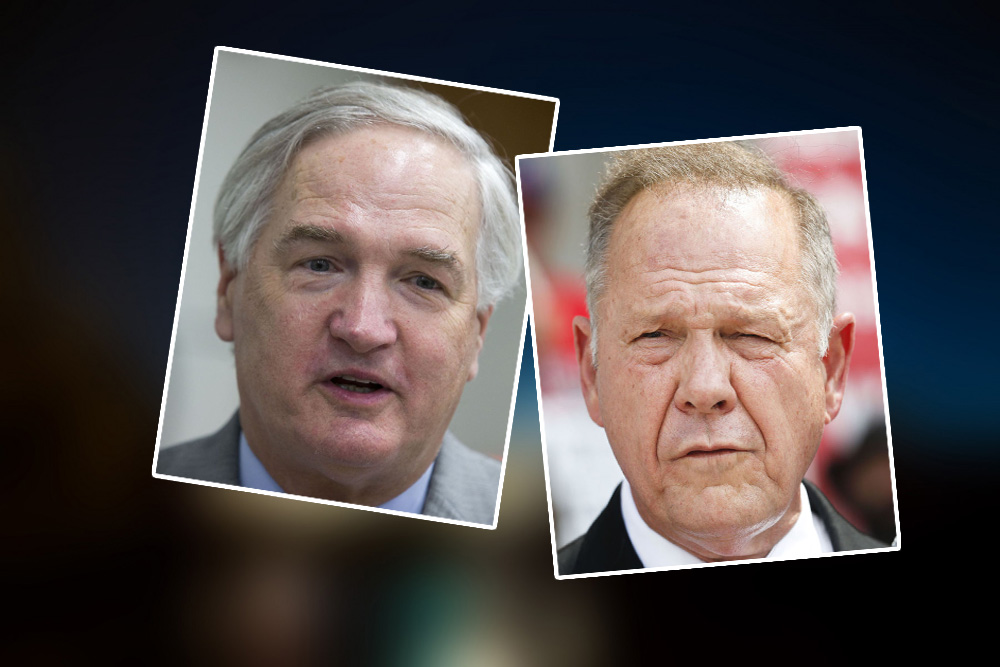
New polling released this weekend gives former Alabama Supreme Court Chief Justice Roy Moore a nearly 20-point lead over sitting Sen. Luther Strange in the Republican primary runoff for U.S. Senate. If the election were held today, 51 percent of respondents support Moore; 32 percent would vote for Strange. Another 17 percent said they were undecided. The poll, conducted by JMC Analytics, suggests three things: – Moore is surging into an early lead, bolstered by a large number of voters who did not support either runoff contender in the Aug. 15 primary. – Evangelical support is fueling Moore’s initial runoff lead. – Endorsements from both President Donald Trump and Senate Majority Leader Mitch McConnell are not helping Strange with voters. Moore is leading throughout most Alabama media markets, except Mobile. Much of that support came from voters who cast a ballot for one of the other primary candidates. Those who supported the “also-rans” went for Moore 51-26 percent, as well as many of those in the Huntsville area who initially supported Congressman Mo Brooks. In the poll, Moore now has a 52-29 percent lead in Huntsville. As for self-described evangelical Christians, Moore leads Strange 58-28 percent, while among non-evangelicals, Strange narrowly leads 42-39 percent. While Trump and McConnell have spent a considerable amount of political capital – as well as millions of dollars – supporting Strange, those efforts appear to have a limited effect. Trump’s endorsement only benefited Strange 25-23 percent (51 percent of respondents said it made little or no difference). McConnell’s support had the opposite effect, with many respondents – by a 45-10 percent margin – saying that it made them less likely to support strange The poll, conducted Aug. 17 and 19, used an automated landline sample of 515 likely primary voters (based on recent electoral participation) from the list of Alabama registered voters. The margin of error was +/- 4.3 percent, with a 95 percent confidence level. According to the polling memo, demographic breakdown respondents was 94 to 5 percent white/black, with the geographic breakdown: 42 percent from Birmingham, 6 percent from Dothan, 24 percent from Huntsville, 15 percent from Mobile, and 13 percent from Montgomery. The winner of the Sept. 26 runoff between Moore and Strange will face Democratic nominee Doug Jones in a December election to determine who will serve the remainder of Attorney General Jeff Sessions‘ Senate term.
Steve Flowers: No matter who wins Alabama’s Senate seat, we still have Richard Shelby
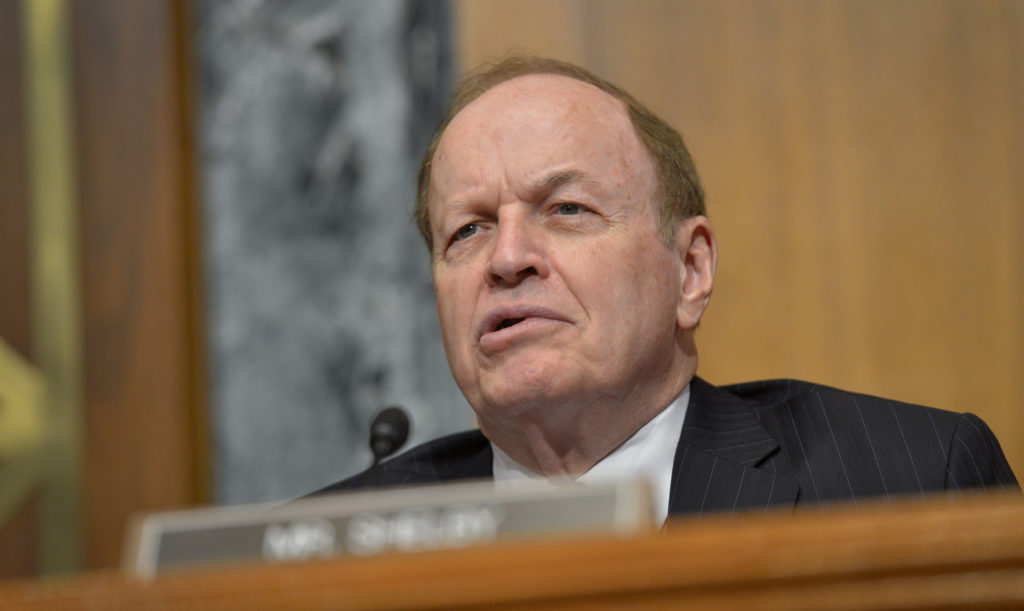
You know the results of Tuesday’s primaries for our U.S. Senate seat. I had to go to press before the vote. However, the assumption was that there would be a runoff in the Republican primary. It is safe to say that the winner of that runoff Sept. 26 will be elected as our next junior U.S. Senator. We are such a reliably Republican state that winning the GOP Primary will be tantamount to election in December. It may surprise you for me to say that it really makes very little difference as to who ultimately wins this seat. Whichever Republican prevails will vote no differently than the other. Despite all the money spent, name calling and campaigning, whoever the Republican primary victor is will vote conservatively right down the line. They will have the identical conservative voting record as Jeff Sessions. They all would vote right on the litmus test hot button GOP issues like abortion, immigration, balanced budget, pro-military, pro-gun and pro-agriculture. Whoever wins will support President Donald Trump and the most conservative Supreme Court nominee available. Therefore, your choice is Tweedle Dee or Tweedle Dum. Your only choice is which personality you like best. It is like whether you like right-wing vanilla or right-wing strawberry ice cream. Whichever Republican you choose out of this batch of ice cream you will still have an ice cream sandwich who will vote for the right wing conservative agenda. Therefore, will one be able to be more efficient? Probably not. Seniority is what dictates power in the Washington Congressional pecking order and guess what — our new Junior U.S. Senator will rank 100th in Seniority in the 100-member U.S. Senate. Their path to power is also limited by their age. If the ultimate victor is one of the projected front-runners, they are getting to the Senate at too old of an age to be a player or make a difference. Roy Moore is 70, Luther Strange is 64, and Mo Brooks is 63. Whoever becomes the Senator will be finished before anybody in Washington knows who they are and none of them will ever chair a committee. Therefore, it really doesn’t matter which Republican ultimately wins. However, do not be dismayed, we have a senior U.S. Senator who can pick up any slack. Folks, our senior Senator is Richard Shelby. We do not even need a second senator when we have Shelby. Shelby, because of his seniority and senatorial prowess and prestige is easily one of the three most powerful members of the United States Senate. Sen. Shelby is the Chair of the Senate Rules Committee. Folks, what that means is that before any law, any budget, or any Supreme Court nominee gets to the floor of the U.S. Senate, Senator Shelby has to approve it. This makes him about as powerful as the president. I am not saying that Shelby trumps Trump in power. However, I am saying that there are about 95 Senators who need the president. There are about five Senators that Trump needs more than they need him. Shelby is one of them. Most special interest groups and really anybody or any entity like the NRA who want anything done in Washington would rather have Richard Shelby on their side rather than Donald Trump. Richard Shelby has reached a pinnacle of power never before seen in Alabama’s rich political lore of U.S. Senators. We have had some great Senators. The names of John H. Bankhead, Lister Hill and John Sparkman are legendary. However, Shelby has surpassed those giants in power and what he has done for Alabama. Richard Shelby is in his 31st year of representing us in the U.S. Senate. He has chaired the Senate Intelligence Committee, the Senate Banking Committee, and now the Senate Rules Committee. Within two years, he will break John Sparkman’s 32-year Senate tenure record. Shelby will probably make a lateral move to chair the Senate Appropriations Committee. If you think he has brought home the bacon the past three decades, you ain’t seen nothing yet. Do not fret about who our junior U.S. Senator is going to be. It really does not matter when you have Richard Shelby. See you next week. ___ Steve Flowers is Alabama’s leading political columnist. His weekly column appears in over 60 Alabama newspapers. He served 16 years in the state Legislature. Steve may be reached at www.steveflowers.us.
Roy Moore, Luther Strange move to runoff for Ala. U.S. Senate race

Former Alabama Supreme Court Chief Justice Roy Moore and sitting Sen. Luther Strange will face off in a runoff election to decide the Republican nominee for the rest of Jeff Sessions’ Senate term. Republicans voting Tuesday did not give a single candidate more than 50 percent of the vote, resulting in the top two vote-getters moving on to a runoff election Sept. 26. Republican voters gave Moore an 8-point lead over Strange, 40 to 32 percent, with 66 of 67 counties reporting. Huntsville Republican Congressman Mo Brooks came in third at 20 percent, with state Sen. Trip Pittman of Baldwin County getting seven percent and Alabama Christian Coalition president Randy Brinson with less than one percent. Unofficial results put turnout at about 15 percent, with 500,390 votes cast of 3,281,781 total registered voters. More than 376,000 Republicans cast ballots. Other Republican candidates receiving less than one percent include Dr. James Beretta, Joseph Breault, Mary Maxwell and Bryan Peeples. The contentious primary featured bitter accusations between Strange and Brooks, which cast no small doubt on whether the sitting incumbent — who enjoyed endorsements from both President Donald Trump and Senate Majority Leader Mitch McConnell — could come in either first or second. What did not help was that Strange was appointed in February by then-Gov. Robert Bentley, who later resigned in disgrace after a sex scandal. Strange also struggled with his association with McConnell, whose popularity plummeted among Republicans. Brooks constantly hammered McConnell, calling the Majority Leader the Senate’s “Swamp King.” McConnell’s Senate Leadership Fund had run waves of negative ads during the primary — many supporting Strange, but much more against Brooks, calling him a “career politician” and blasting his nonsupport of Trump in 2016. Late in the race, Strange finally received Trump’s endorsement (on Twitter), even though Strange also did not publicly endorse the New York real estate mogul during last year’s presidential primaries. As for Democrats, former federal prosecutor Doug Jones looks to be winning the primary outright with more than 61 percent of the votes cast. Jones, received a late-primary endorsement from former Vice President Joe Biden. While he led polling throughout the primary season, Kennedy’s name recognition — despite being unrelated to the famous Kennedy clan — helped earn him only 21 percent of Democratic primary voters. Other Democrats in the race were pastor Will Boyd, a former Greenville, Illinois City Councilman (who received six percent); Talladega County Constable Vann Caldwell, businessman Jason Fisher (two percent); activist Michael Hansen (who also received seven percent) and Charles Nana. Given Alabama’s strong Republican lean (the state elected Trump by nearly 28 points over Hillary Clinton), whoever wins the runoff — either Moore or Strange — will most likely represent the state in the U.S. Senate. The general election is Dec. 12.

